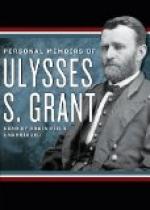U. S. GRANT, Lieut.-General.
Lee acceded to this; but delays in transmitting the correspondence brought it to the 7th of June—forty-eight hours after it commenced —before parties were got out to collect the men left upon the field. In the meantime all but two of the wounded had died. And I wrote to Lee:
COLD HARBOR, VA., June 7, 1864. 10.30 A.M.
GEN. R. E. LEE, Commanding Army of N. Va.
I regret that your note of seven P.M. yesterday should have been received at the nearest corps headquarters, to where it was delivered, after the hour which had been given for the removal of the dead and wounded had expired; 10.45 P.M. was the hour at which it was received at corps headquarters, and between eleven and twelve it reached my headquarters. As a consequence, it was not understood by the troops of this army that there was a cessation of hostilities for the purpose of collecting the dead and wounded, and none were collected. Two officers and six men of the 8th and 25th North Carolina Regts., who were out in search of the bodies of officers of their respective regiments, were captured and brought into our lines, owing to this want of understanding. I regret this, but will state that as soon as I learned the fact, I directed that they should not be held as prisoners, but must be returned to their commands. These officers and men having been carelessly brought through our lines to the rear have not determined whether they will be sent back the way they came, or whether they will be sent by some other route.
Regretting that all my efforts for alleviating the sufferings of wounded men left upon the battle-field have been rendered nugatory, I remain, &c.,
U. S. GRANT, Lieutenant-General.
I have always regretted that the last assault at Cold Harbor was ever made. I might say the same thing of the assault of the 22d of May, 1863, at Vicksburg. At Cold Harbor no advantage whatever was gained to compensate for the heavy loss we sustained. Indeed, the advantages other than those of relative losses, were on the Confederate side. Before that, the Army of Northern Virginia seemed to have acquired a wholesome regard for the courage, endurance, and soldierly qualities generally of the Army of the Potomac. They no longer wanted to fight them “one Confederate to five Yanks.” Indeed, they seemed to have given up any idea of gaining any advantage of their antagonist in the open field. They had come to much prefer breastworks in their front to the Army of the Potomac. This charge seemed to revive their hopes temporarily; but it was of short duration. The effect upon the Army of the Potomac was the reverse. When we reached the James River, however, all effects of the battle of Cold Harbor seemed to have disappeared.




